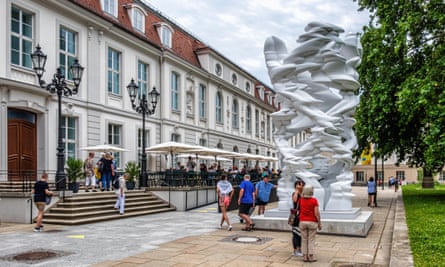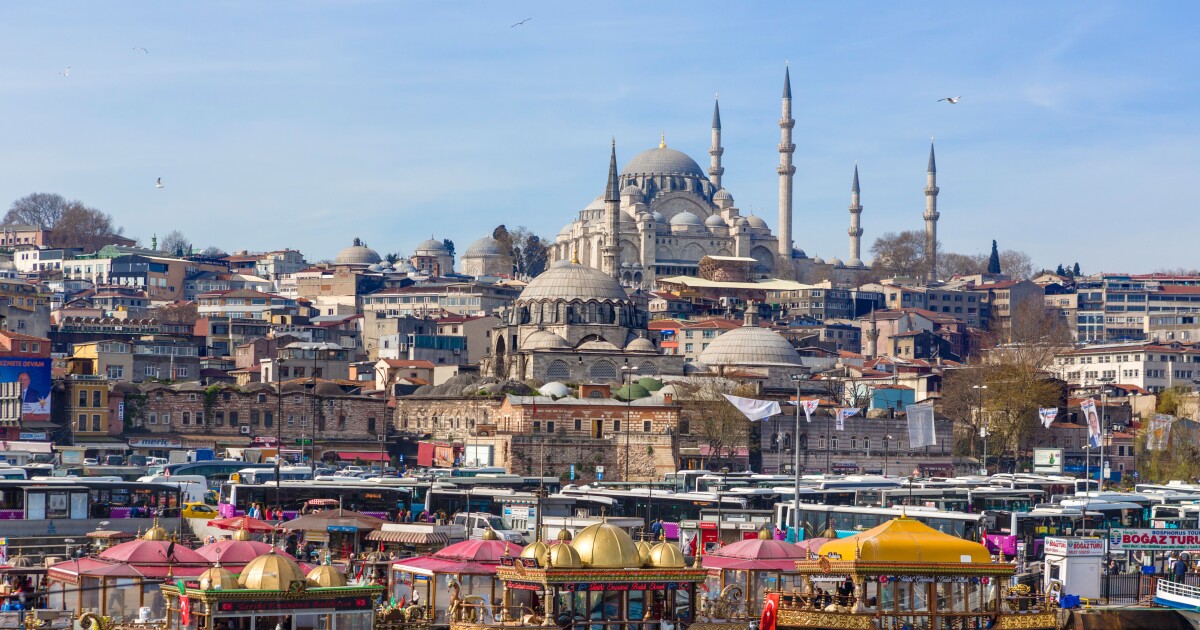Top British sculptor hits back in censorship row over loan to Turkish gallery
One of Britain’s leading sculptors, Sir Tony Cragg, has defended his decision to loan a work to Istanbul’s top art museum following criticism from a prominent Turkish artist of the country’s restrictions on freedom of expression.
After four years in construction, the new five-storey, 15,000 sq metre Istanbul Modern will open this year, with Cragg’s white sculpture, entitled Runner, in a prime spot at its entrance.
President Recep Tayyip Erdoğan has clamped down on civil rights in Turkey, with new disinformation laws being used in recent days to arrest a journalist.
Artist Mürüvvet Türkyılmaz, who pulled her work from the old Istanbul Modern in 2011 over a censorship row, said she was disappointed with Turner prize-winner Cragg, a leading light in sculpture whose work has been viewed by the Princess of Wales and who made his mark after being invited in 1977 to contribute to the Silver Jubilee. She said: “If there is freedom of expression in Turkey, why are so many people still in prison for just expressing on human rights? It means that while they are in, we are in the open prison too.”
Cragg told the Observer that he understood Türkyılmaz’s critique but hoped his piece, which shows “the inner life under a rigid surface”, could be a positive addition to Turkey’s cultural scene. “I understand her position in part, but I have made my work for the past 60 years with the understanding that art has a positive effect on people’s minds and lives,” he said. “Art is a force for good. I exhibit my work for everyone, not for a specific group but for the entire, in this case, Turkish population.
“They have asked a fantastic architect to build the building, and I know some of the people working in the museum have politically and socially very good intentions. We live in an imperfect world, and if you wanted you could almost find a reason not to exhibit anywhere.”
The new Istanbul Modern building in the Karaköy district has been designed by Italy’s Renzo Piano, who worked with British designer Richard Rogers on Paris’s Pompidou centre.
Questions about whether international artists should cooperate with Turkish museums have intensified recently. In October, Turkey’s parliament ratified a law under which those accused of spreading disinformation can be jailed for up to three years.
A journalist was arrested last week after tweeting that a girl had allegedly been sexually abused by men including police officers and soldiers. A Turkish court also sentenced Istanbul’s mayor to more than two years in prison and banned him from politics for calling members of Turkey’s supreme election council “fools” in a press release three years ago.
The old Istanbul Modern was opened in 2004 with funding from industrial group Eczacıbaşı, but it became embroiled in a censorship row in 2011. Eight prominent artists, including Türkyılmaz, pulled their work in response to claims the museum had rejected a piece by David “Bubi” Hayon for a charity auction. The work was a large seat with a bedpan in the middle, said to be a non-political criticism of the concept of museums.
The incident snowballed into a debate about the fact that many major Turkish cultural institutions are backed by corporate entities that lack transparency.
Türkyılmaz said: “Maybe my co-worker Tony Cragg does not know this censorship crisis despite [it] being internationally published … I do not know his artistic attitude exactly in this kind of crisis. In my opinion, if there is an art institutional crisis somewhere, the artists or the art workers should have the common attitude to protect basic rights.

“I don’t think I will exhibit my work there. Because, since that period, as an artist we couldn’t have any dialogue to solve the crisis. This question remained in the air. Maybe it was not already a crisis for them and it was a simple scandal to be forgotten. Maybe this institutional attitude was the main problem.”
Cragg said he believed it was common practice for museums to have the final decision on works to be used.
At the time of the row, the museum accepted the artists’ requests to withdraw their works and issued a statement defending its decision over the charity auction, saying it was international practice that “the curatorial team … determines which works will be included”.
It added: “Istanbul Modern has a strong record of opposing censorship and encouraging freedom of expression in art.”



